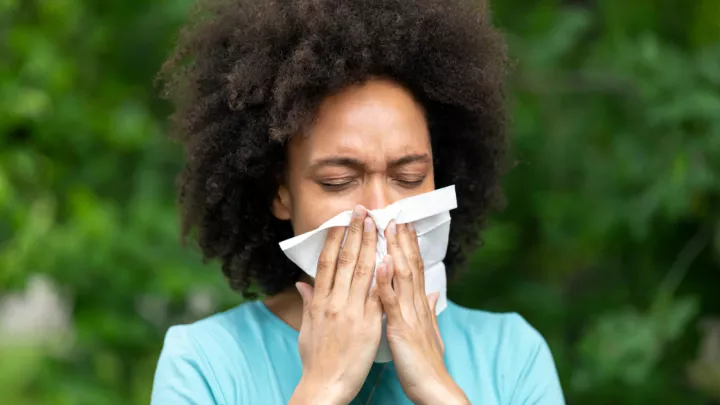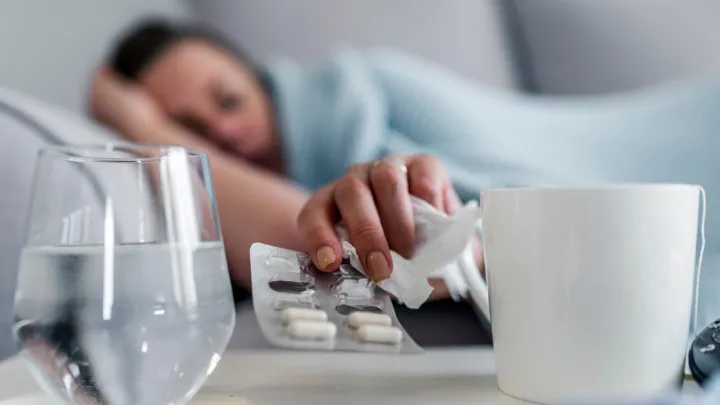Does being cold make you sick?

“Put your coat on, or you’ll catch a cold!” Everyone in a cold-weather city has heard a caregiver shout this at them at one point or another. But does exposure to the cold make you sick, or is it just an old myth?
Let’s explore whether being cold makes you sick and how you can boost your immune system during those chilly months.
Cold exposure and illness
“While cold weather exposure doesn’t directly cause illness, cold exposure does lead to some vulnerability,” says Thomas Strawmier, APRN-NP, an internal medicine nurse practitioner.
When you’re outside in cold weather and then go inside where everybody else is, you’ll be breathing harder, your nose may run and other symptoms can develop. These side effects of cold exposure can make it easier for illness to spread.
Prolonged cold exposure can also lead to serious health conditions. “Direct cold exposure itself can lead to low blood temperature, hypothermia and other conditions,” says Strawmier. “If you’re outside in cold temperatures without proper gear, you can get acutely sick.”
Increased illnesses during cold weather
People aren't outside or spreading out as much when it's cold outside. Instead, they gather indoors. This increased proximity and lack of outdoor gathering spaces, combined with cold and flu season, increase the chances of spreading illness.
Cold weather also coincides with major holidays like Thanksgiving and Christmas. "Many people are getting on airplanes, traveling across the country, and then getting together with a bunch of people," says Strawmier. These conditions result in an increased spread of sickness. “If you're gathering together with a lot of people in the same house and somebody's sick, then everybody's exposed to that illness," says Strawmier. "That's why preventive measures are essential, especially during cold weather.”
How to prevent the spread of sickness
"If you have a cold, cough or other viral-type symptoms, you want to limit your exposure to others," says Strawmier. "So, if you're in your family's house, you want to avoid them and create distance between you and them, cover your mouth when you cough and wear a mask."
Likewise, avoid putting your hands on public things like railings or escalators. Viruses can live on surfaces and transmit via such contact.
Accordingly, you should also wash your hands as much as possible. "Hand sanitizer works, but soap and water is the best deterrent," says Strawmier. “You want to isolate yourself, ensure you're wearing a mask, and wash your hands frequently - especially if you're taking care of someone who's ill, like a young child."
Vaccines are another key preventive measure. "Certain diseases, like the recent measles outbreak in Texas, are able to spread because of a lack of vaccines," says Strawmier. “If you had your vaccine or don't know if you're immune, you can get tested to determine if your vaccine is still working or if you need to revaccinate.”
Finally, home COVID and flu tests are readily available and can help you avoid exposing your illness to other people. “But be careful you don’t test too early,” says Strawmier. “Sometimes there’s a period between exposure to an illness and expressing symptoms. You need to give the ailment time to incubate before you test for it, or you’re more likely to get a false negative.”
Strengthening your immune system strong in cold weather
How you treat your body throughout the year will determine how strong your immune system is during cold weather. "Everything is dependent on your diet and exercise," says Strawmier. "Ensure you hydrate and eat the right foods, including many leafy green vegetables."
While a healthy diet and regular exercise are the foundation of a strong immune system, there are ways to boost it when it's cold. "You can increase your vitamin C intake with oranges or supplements," says Strawmier. “Sometimes, adding zinc can also help minimize the effects of viral illnesses."
Still, strengthening your immune system is difficult without proper nutrition and exercise. So, ensure you eat a healthy diet, drink enough water, exercise regularly and avoid crowded spaces with sick people.







